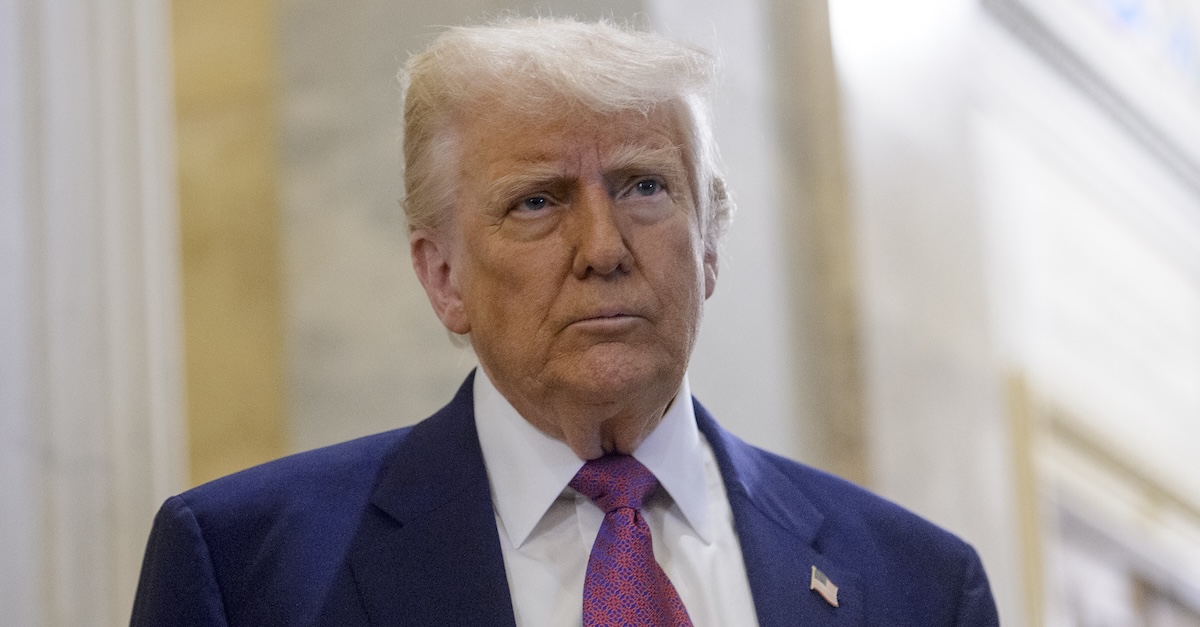
President Donald Trump speaks to reporters as he arrives for a meeting with the House Republican Conference at the Capitol, Tuesday, May 20, 2025, in Washington (AP Photo/Rod Lamkey, Jr.).
A federal judge on Wednesday said that the Trump administration had “unquestionably” violated his order by deporting several migrants to South Sudan — a country from which none of the migrants are from — without due process or a reasonable opportunity to raise concerns of their fear of the war-torn nation, an action he said could amount to criminal contempt of court.
U.S. District Judge Brian E. Murphy upbraided attorneys from the Justice Department, accusing them of ignoring the “long history” of legal precedent surrounding due process rights as well as recent orders from the U.S. Supreme Court when they sent seven men to South Sudan with less than 24 hours notice.
Murphy last month issued a preliminary injunction barring the government from deporting migrants to third countries without giving them a “reasonable opportunity” to raise concerns about that country and the possible violence they could face.
Murphy scheduled a hearing after an emergency motion filed by attorneys for the plaintiffs informed the court that at least two of their clients had been notified on Monday evening that they were being removed to South Sudan and were transported out of ICE facilities at around 9:30 a.m. Tuesday morning.
“The department’s actions in this case are unquestionably violative of this court’s order,” Murphy said at Wednesday’s hearing. “It is plain to me that an ‘opportunity to be heard’ of only several hours that were not during business hours, where you couldn’t raise consult with your attorney or your family is insufficient. It was impossible for these people to have a meaningful opportunity to object to their removal to South Sudan.”
Murphy emphasized that even the Supreme Court justices recently confirmed that 24 hours of notice is “plainly insufficient” for the purpose of due process, stating, “I don’t see how anybody could think these people had a reasonable chance to object.”
Lawyers for the DOJ attempted to push back on Murphy’s reasoning, saying that, as opposed to other migrant-detainees that may seek to file petitions in habeas corpus, all the detainees in the instant case were required to do was “express fear” about being deported, which the DOJ said “did not happen.”
“These individuals have gone through [removal] proceedings and been given a chance to express fear,” a DOJ attorney said, attempting to differentiate the case from similar cases involving deportations under the Alien Enemies Act. “They know what the system requires because they’ve been through it. They know they can express fear if they fear going to a particular country.”
But Murphy was not convinced.
I don’t agree and I find that my PI [preliminary injunction] has been violated,” he said. The judge said he would decide whether the government’s actions were “criminally contemptuous” at a later date.
At the time of the hearing, the migrants who were removed Tuesday morning remained in U.S. custody while onboard a plane in South Sudan. Murphy ordered that they not be turned over to the custody of another country without his express permission.
Plaintiffs’ attorneys are asking the court to order the migrants to be returned to the U.S. immediately while the DOJ suggested a “narrowly tailored” remedy that would involve the migrants undergoing a reasonable fear screening from their current location.
Wednesday’s hearing came about a week after Murphy amended his initial injunction to ensure the defendants “did not seek to elude their obligations” under the court’s order “by arranging for other agencies to effectuate removals to third countries from Guantanamo Bay” after finding that the administration failed to provide notice and a meaningful opportunity for plaintiffs to challenge their removal.
Murphy, an appointee of Joe Biden, did not mince words when he issued his preliminary injunction in April, calling out the Trump administration for defending what he believed to be unlawful legal positions.
“Defendants argue that the United States may send a deportable alien to a country not of their origin, not where an immigration judge has ordered, where they may be immediately tortured and killed, without providing that person any opportunity to tell the deporting authorities that they face grave danger or death because of such a deportation,” he wrote in a 48-page memorandum and order. “All nine sitting justices of the Supreme Court of the United States, the Assistant Solicitor General of the United States, Congress, common sense, basic decency, and this Court all disagree.”
The judge said the record clearly showed the government had deported people to countries they have no connection to — because officials have admitted as such and argued such policies are aboveboard.
The judge rubbished this state of affairs, at length:
The Court finds it likely that Defendants have applied and will continue to apply the alleged policy of removing aliens to third countries without notice and an opportunity to be heard on fear-based claims — in other words, without due process. Defendants have repeatedly argued that they have no obligation to provide any process whatsoever when newly designating a third country for removal. Defendants’ own avowed position and the numerous declarations Plaintiffs have provided substantiate both the prior and future use of Defendants’ policy of providing no notice prior to third-country removal.
Those admissions by the government, the court said, were untenable — and only worked in favor of the plaintiffs.
“Here, the threatened harm is clear and simple: persecution, torture, and death,” Murphy continues. “It is hard to imagine harm more irreparable,” he wrote. “Plaintiffs are simply asking to be told they are going to be deported to a new country before they are taken to such a country, and be given an opportunity to explain why such a deportation will likely result in their persecution, torture, and/or death. This small modicum of process is mandated by the Constitution of the United States.”

